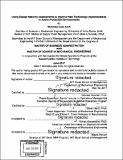Using design maturity assessments to improve new technology implementation in active production environments
Author(s)
Arch, Nicholas Luke
DownloadFull printable version (6.750Mb)
Other Contributors
Leaders for Global Operations Program.
Advisor
Thomas Roemer and David Hardt.
Terms of use
Metadata
Show full item recordAbstract
Without the design, development, and implementation of new technologies, companies that are currently innovative will be quickly surpassed by their competitors. Company A, a large aerospace company with a long history of introducing new technologies, is aiming to improve its new technology implementation process to continue to be successful in a competitive industry. While generally successful when implementing new technologies, Company A frequently faces unexpected challenges during implementation. The ability to effectively implement technologies in production environments will increase the likelihood that the business case for a new technology will be realized. Company A is in the process of implementing an automated fabrication solution for Component 1 that could eliminate risks associated with ergonomics and potential production volume increases. The goal of this project was not only to create a plan to aid the implementation of the automated fabrication technology for Component 1, but to broadly research technology implementation to determine how industrial companies can turn implementation into a competitive advantage. While creating multiple plans to implement the automated fabrication technology, research was performed about risk management, available tools to aid the implementation process, and lessons learned from past implementations. A significant part of new technology implementation involves identifying, prioritizing, and mitigating risk associated with the technology and the production system. There are many general and company-specific tools that aim to aid this process, but most of these tools focus on the technology, not the production system. The theory of Operational Readiness was developed as a way to combine the advantages of numerous design maturity assessment tools. Operational Readiness involves confirming that the new technology satisfies its requirements, is manufacturable, and fits within the overall product system. Operational Readiness also ensures that the production system is ready to accept the new technology. By utilizing Operational Readiness, cross-functional design, development, and implementation teams will be forced to take a system-wide view of the new technology implementation. This rigorous assessment process will be challenging and time-consuming, but the results will generate significant benefits to companies that are willing and able to use the theory of Operational Readiness.
Description
Thesis: M.B.A., Massachusetts Institute of Technology, Sloan School of Management, in conjunction with the Leaders for Global Operations Program at MIT, 2017. Thesis: S.M., Massachusetts Institute of Technology, Department of Mechanical Engineering, in conjunction with the Leaders for Global Operations Program at MIT, 2017. Cataloged from student-submitted PDF version of thesis. Includes bibliographical references (pages 123-124).
Date issued
2017Department
Leaders for Global Operations Program at MIT; Massachusetts Institute of Technology. Department of Mechanical Engineering; Sloan School of ManagementPublisher
Massachusetts Institute of Technology
Keywords
Sloan School of Management., Mechanical Engineering., Leaders for Global Operations Program.